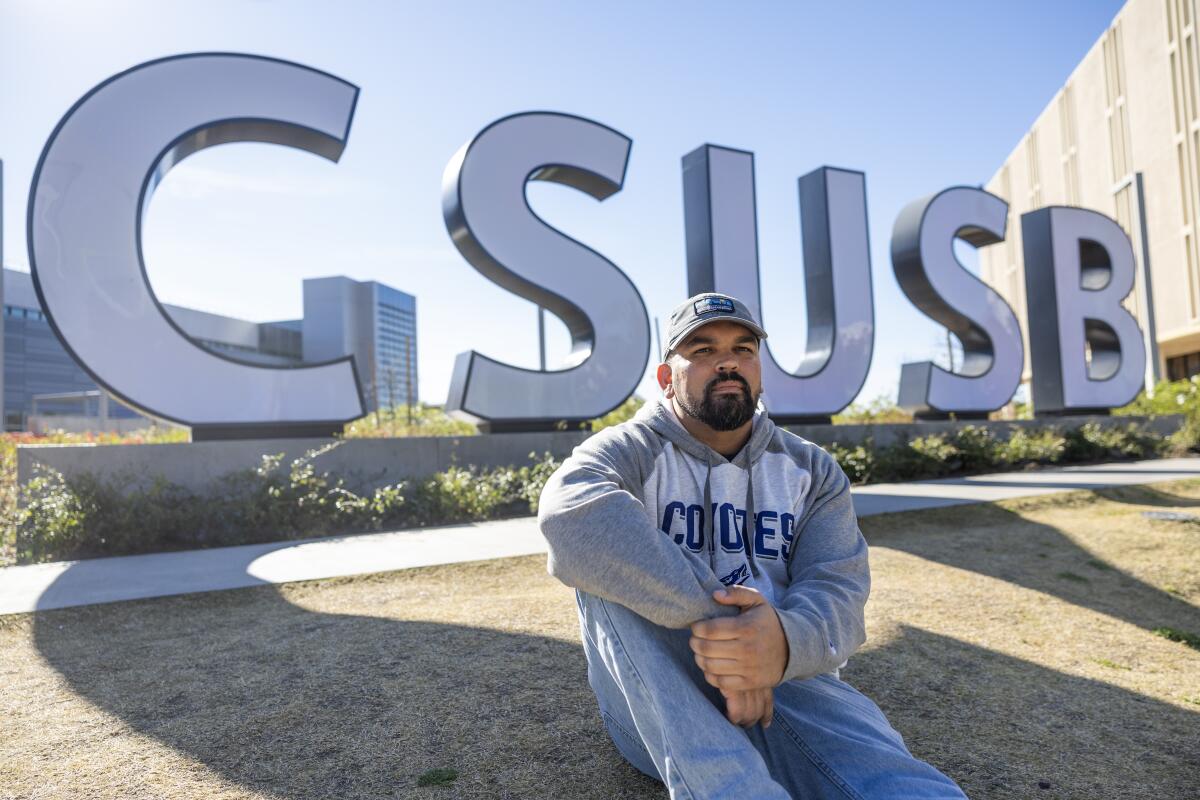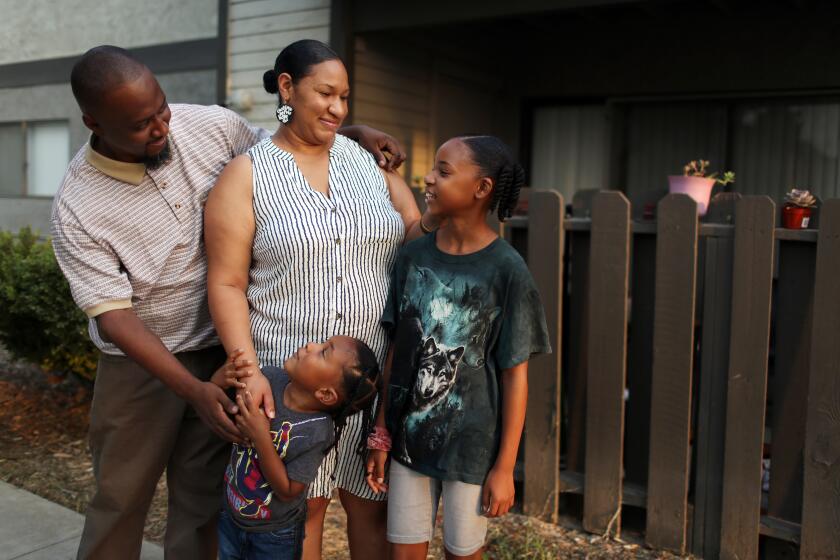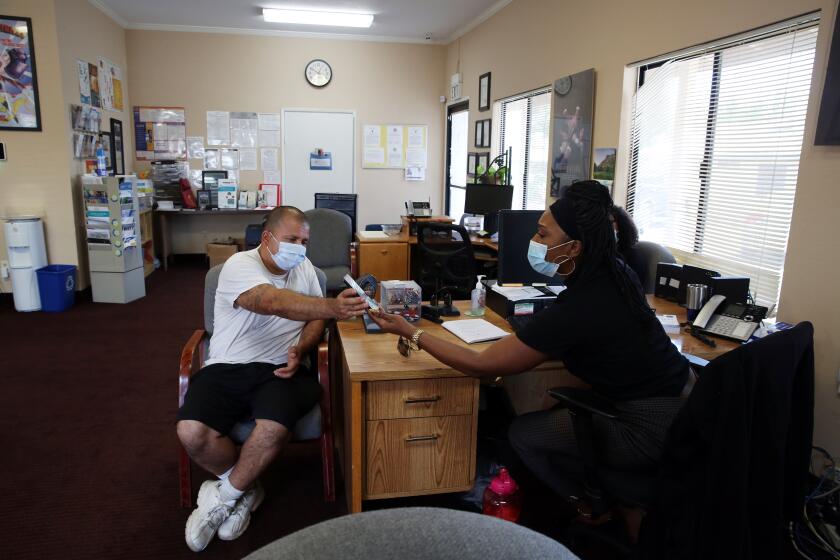New law has Californians with criminal records ‘quite hopeful’ they’ll finally find housing

In 2021, four years after finishing her last jail term and living in transitional housing in Riverside County, Erica Smith was ready for a permanent home.
She’d saved enough to cover a security deposit and the first and last month’s rent for an apartment for her and her daughter. But after three months of searching, Smith ran out of money, having burned through $10,000 on stays in motel rooms. She’d never found a place to live.
Smith had a series of drug-related and theft convictions on her record. Numerous cities within Riverside had adopted laws called crime-free housing that aimed to prohibit landlords from renting to tenants with criminal histories.
“It’s just terrible,” said Smith, 54. “Why am I not able to provide a place for me and my daughter to live?”
Soon, Smith will have more opportunities for housing, courtesy of a new state law. Assembly Bill 1418, which takes effect Jan. 1, will ban local governments across California from enforcing crime-free housing policies. Not only do crime-free housing rules stop landlords from renting to those with prior convictions, but many also call for the eviction of tenants based on arrests or contact with law enforcement.
Nearly 2,000 communities in the U.S. and elsewhere encourage landlords to evict or exclude tenants who have had some interaction with law enforcement.
Dozens of cities and counties in California began implementing the laws during the wave of “tough on crime” measures in the 1990s, with local elected officials, police and prosecutors contending they helped keep neighborhoods safe.
But crime-free housing policies have come under increasing criticism as unfair, unforgiving and racially discriminatory. The blanket bans have prevented spouses and children of those convicted from accessing housing and forced evictions of domestic violence victims after police responded to their apartments.
Under AB 1418, local governments will no longer be able to mandate landlords evict and exclude tenants for alleged or prior criminal conduct. It does not prevent landlords from initiating nuisance-related evictions and screening prospective residents based on criminal histories of their own accord.
More than 100 cities passed crime-free housing policies between 1995 and 2020, covering potentially 4.5 million renters, according to a new report by Rand Corp., a Santa Monica-based nonpartisan research institution.
The study found that contrary to proponents’ claims, crime-free housing did not lower crime rates.
“Our overall finding is crime-free housing policies are completely ineffective,” said Max Griswold, an assistant policy researcher at Rand and the study’s lead author.
In contrast, the analysis determined that the rules increased eviction rates on average by about 20%, an effect Griswold called “unexpectedly large.” The study found that cities with crime-free housing policies have a larger percentage of Black residents than those without.
“They’re creating more segregation,” Griswold said of the rules. “At the end of the day, that seems to be their purpose.”
California legislators vote to ban laws that force landlords to evict tenants based on criminal histories. Such policies can disproportionately affect Black and Latino renters.
Momentum to curtail crime-free housing laws has grown in recent years.
A 2020 Times investigation found the policies had disproportionately affected Black and Latino renters in California. Last year, the city of Hesperia and San Bernardino County Sheriff’s Department agreed to pay $1 million to settle a civil rights lawsuit filed by the U.S. Department of Justice alleging crime-free housing policies targeted Black and Latino residents for removal.
Citing The Times’ story and the Hesperia case, Assemblymember Tina McKinnor (D-Hawthorne) introduced AB 1418 in February. Soon after, California Atty. Gen. Rob Bonta issued formal guidance to local governments urging them to reconsider their programs on racial justice grounds.
“Doing that on the heels of the big Hesperia case put cities on notice that the walls were closing in on them,” said Anya Lawler, a lobbyist representing the California Rural Legal Assistance Foundation and the National Housing Law Project, two nonprofits that are principal supporters of the bill.
Over the summer, California’s Reparations Task Force, in its recommendations for remedying the legacies of slavery and other more modern government-sanctioned policies that discriminated against Black residents, called for repealing crime-free housing laws.
AB 1418 attracted no formal opposition. It passed both houses of the Legislature without a dissenting vote in a committee or on the Assembly or Senate floors. Gov. Gavin Newsom signed AB 1418 in October.
Among the new law’s backers is the California Apartment Assn., the state’s largest landlord organization, which contended that local governments shouldn’t require landlords to exclude or evict tenants.
Hesperia and San Bernardino County Sheriff’s Department will pay $1 million to settle a suit alleging discrimination against Black, Latino tenants.
As AB 1418 made its way through the Legislature, the two largest cities in the Inland Empire, Riverside and San Bernardino, agreed to repeal their crime-free housing laws. San Bernardino did so as part of a settlement challenging the policy in a case filed by legal aid groups, and joined by Bonta’s and Newsom’s offices, on behalf of low-income residents in the city.
At a hearing on the policy in August, Michael Griggs told San Bernardino City Council members that he’d faced hurdle after hurdle trying to find housing. Griggs served six years in prison for robbery and assault charges related to a crime he committed as a teenager and was released in 2015.

While incarcerated, Griggs began taking college classes. He earned a scholarship to Pitzer College and now is pursuing a master’s degree in social work at Cal State San Bernardino.
After his acceptance into graduate school in 2022, Griggs said, he spent six months searching for apartments throughout the Inland Empire only to have landlords reject him because of his criminal history. He said he found a place in Highland, a city with a crime-free housing policy about 10 miles from campus, only because the landlord’s background check did not extend to convictions that occurred longer than seven years prior.
“People want to move forward with their life,” said Griggs, 34. “How can they move forward with their life without having the first fundamental thing, which is housing, a safe place to live?”
Griggs said he’s looking forward to AB 1418 erasing crime-free housing policies on a broader scale.
“It’s hard work to do this at the city level,” he said. “I’m happy that the state is stepping up.”
Local officials in Riverside and San Bernardino said they had already scaled back enforcement of crime-free housing programs. Ryan Railsback, a spokesperson for Riverside city police, said the department stopped dedicating an officer to overseeing crime-free housing rules in 2020 because of staffing shortages that emerged during the COVID-19 pandemic.
In San Bernardino, the discussions at the state and local levels about potential harms caused by crime-free housing rules led city leaders to reconsider them after three decades on the books, said Jeff Kraus, a city spokesperson.
“The nature of crime has changed,” Kraus said. “The laws have changed. People’s opinions have changed. It’s probably a good time to review them now.”
For Smith, who remains homeless and living in her car with her 12-year-old daughter, AB 1418 represents another chance. She’s protested crime-free housing policies alongside advocacy groups locally and at the state level, and recently obtained a federal Section 8 housing voucher that would subsidize her rent.
Smith has yet to find a landlord that will accept the voucher, but she is counting on that to change.
“I’m excited and quite hopeful that because I’ve been dutiful in opposing these crime-free rules that part of the reward will be that housing for us is coming very soon,” Smith said.
More to Read
Sign up for Essential California
The most important California stories and recommendations in your inbox every morning.
You may occasionally receive promotional content from the Los Angeles Times.











